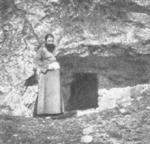Disable ads!
Rabbi Hillel
Hillel (Hebrew: הלל; variously called Hillel HaGadol, or Hillel HaZaken, Hillel HaBavli or HaBavli; born Babylon traditionally c. 110 BCE, died 10 CE in Jerusalem) was a famous Jewish religious leader, one of the most important figures in Jewish history. He is associated with the development of the Mishnah and the Talmud. Renowned within Judaism as a sage and scholar, he was the founder of the House of Hillel school for Tannaïm (Sages of the Mishnah) and the founder of a dynasty of Sages who stood at the head of the Jews living in the land of Israel until roughly the fifth century of the Common Era. He is popularly known as the author of two sayings: (1) "If I am not for myself who is for me? And being for my own self, what am 'I'? And if not now, when?" and (2) the expression of the ethic of reciprocity, or "Golden Rule": "That which is hateful to you, do not do to your fellow. That is the whole Torah; the rest is the explanation; go and learn." "As Hillel the Elder had stated, whosoever destroys a soul, it is considered as if he destroyed an entire world. And whosoever that saves a life, it is considered as if he saved an entire world." Hillel lived in Jerusalem during the time of King Herod and the Roman Emperor Augustus. In the Midrash compilation Sifre (Deut. 357), the periods of Hillel's life are made parallel to those in the life of Moses. Both lived 120 years (Deut. 34:7), and at the age of forty Hillel went to the Land of Israel; forty years he spent in study; and the last third of his life he was the spiritual head of the Jewish people. A biographical sketch can be constructed; that Hillel went to Jerusalem in the prime of his life and attained a great age. His activity of forty years likely covered the period of 30 BCE to 10 CE.
 Read more on wikipedia.org Read more on wikipedia.org
 All quotes by Rabbi Hillel All quotes by Rabbi Hillel
 Edit Edit
|

|
|
|
|
|
Background photo by Giuliana
|